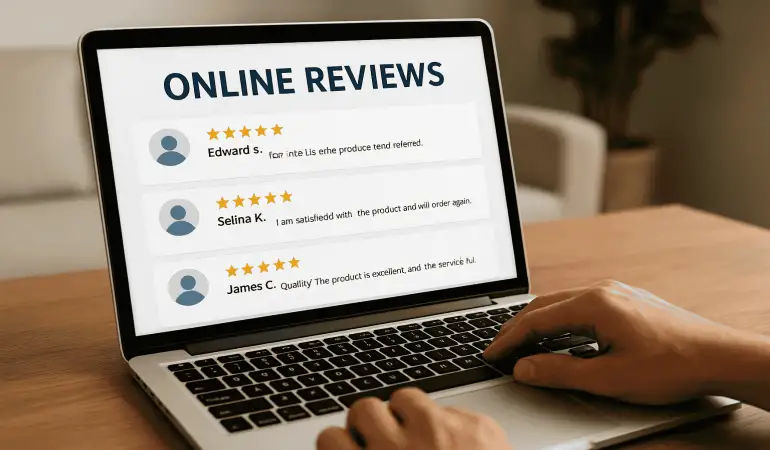The Truth About Online Reviews: How to Tell Real from Fake in Nigeria
Learn how to spot fake online reviews in Nigeria. This 2025 guide explains signs of fake ratings, how to verify real feedback, and tools to protect yourself from scams when shopping or choosing services online.
October 17, 2025 20:44
Online reviews influence how Nigerians choose products, restaurants, and services. A good review can boost sales. A bad one can destroy trust. But not every review is real. Many fake reviews flood websites and business directories every day.
Knowing how to spot fake reviews saves you from scams and poor service. This guide explains what fake reviews look like, why they exist, and how to verify real ones before making decisions.
1. Why Fake Reviews Exist
Fake reviews exist because businesses want quick reputation boosts. Some pay people to post positive comments. Others post fake negative reviews to damage competitors. Both hurt consumers and create false impressions.
- Paid positive reviews: These come from marketers or freelancers paid to praise a brand.
- Fake negative reviews: These are planted by rivals to discourage potential buyers.
- Bot-generated reviews: Automated scripts produce short, repeated messages that sound unnatural.
Fake reviews are common on social media pages, online malls, and local directories. Recognizing them protects your money and time.
2. Warning Signs of Fake Reviews
Watch for these red flags when reading online reviews:
- Too generic: Reviews that say only “Good service!” or “Highly recommended!” without any details.
- Same wording: Multiple reviews using identical phrases or writing style.
- Clustered dates: Dozens of reviews posted within one or two days.
- Overly emotional tone: Extreme praise or anger that feels scripted.
- Anonymous or new accounts: Reviewers with no photo or history on the platform.
If a listing has many of these signs, be cautious before trusting it.
3. How to Spot Real Reviews
Real reviews are balanced and specific. They mention real experiences, timelines, and small details that only a genuine customer would know. Here’s what to look for:
- Specific product or service details: Example, “The laptop battery lasted only four hours” sounds real.
- Mixed opinions: Real customers point out both good and bad parts.
- Personal context: Look for words like “I bought,” “I tried,” or “My delivery came.”
- Profile consistency: Check if the reviewer has other activity or verified purchases.
Genuine reviewers sound natural, not promotional. Their tone is calm and descriptive.
4. Use Reverse Search Tools
Fake review agencies often reuse the same content across multiple sites. Copy part of a suspicious review and paste it into Google search with quotes. If it appears word-for-word elsewhere, it’s fake.
Another method is checking the reviewer’s username on other sites. If you find identical reviews under different business names, avoid that listing.
5. Cross-Check on Multiple Platforms
Never rely on one review source. Compare ratings across at least three platforms. For example:
- Compare reviews on Google Maps with Facebook pages.
- Check verified business listings on FindDir Nigeria.
- See if the same business has reviews on Nairaland or Instagram comments.
Consistent feedback across many sources usually means the reviews are real.
6. Watch the Reviewer’s Timing
Fake reviews often appear right after a product launch or during a promo. When a business gets 50 reviews overnight, something is wrong. Real customers leave feedback gradually over time.
Check if reviews span several months. Long-term feedback indicates real user experience.
7. Use Browser Extensions to Detect Fake Reviews
Several browser extensions now help detect fake reviews automatically. They analyze text patterns and reviewer history.
- Fakespot: Works with Amazon, Yelp, and TripAdvisor.
- ReviewMeta: Evaluates reviews and filters suspicious ones.
- ReviewChecker: Helps identify duplicate reviews across platforms.
While some tools focus on global markets, they also work for Nigerian users when analyzing international platforms.
8. Check the Response from the Business
Real businesses reply professionally to both good and bad reviews. Fake businesses rarely respond, or they reply with the same copied message every time.
A proper reply includes apology, follow-up steps, or customer service contact. Lack of such responses signals low authenticity.
9. Be Careful with Influencer Reviews
Some influencers get paid to post fake testimonials. While this is legal if disclosed, most do not mention sponsorship. Treat overly positive posts with caution, especially if they all appear during a campaign period.
Look for honesty in tone and disclosure lines such as “paid partnership” or “sponsored.” Without them, you may be reading promotional content disguised as feedback.
10. What to Do When You Find Fake Reviews
If you suspect fake reviews, report them directly to the platform. Many directories and review sites allow users to flag suspicious posts. Provide screenshots and links for quick action.
You can also contact the business directly to ask about your concern. Genuine companies care about their reputation and will address it immediately.
11. How Businesses Can Build Real Reviews
If you own a small business in Nigeria, always encourage genuine reviews from real customers. Avoid buying fake testimonials. Instead:
- Ask happy customers to leave honest feedback after purchase.
- Reply to every review professionally.
- List your verified details on trusted platforms like FindDir Nigeria.
Building authentic reviews takes time but creates long-term trust and higher search visibility.
12. Final Advice
Online reviews help you make smarter decisions. But in 2025, you must separate truth from promotion. Look for patterns, details, and balance. Use verification tools and cross-check across platforms. Genuine reviews are always specific, honest, and steady over time.
Protect yourself and support real businesses by reporting fakes. Your awareness helps make Nigeria’s digital market safer for everyone.



